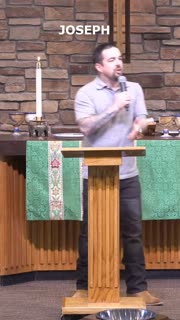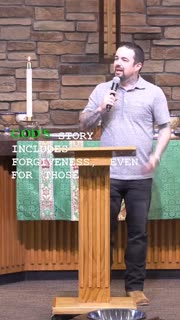Embracing Forgiveness: Lessons from Joseph's Story
Devotional
Sermon Summary
Bible Study Guide
Sermon Clips
1. "Forgiveness is this idea that we overlook somebody else's wrongs, that we overlook someone's debt. Forgiveness is this idea that we give up something that we don't want to give. Forgiveness is this idea that we take away the guilt from the guilty party. This whole concept of forgiveness is incredible because it runs exactly against what we naturally want to do. It runs exactly against what our natural human instinct is." [22:14] (30 seconds)
2. "Forgiveness doesn't always mean, or forgiveness definitely doesn't mean continuing to put up with abuse. Forgiveness doesn't always mean reconciliation. You can forgive somebody and still not have them be a part of your life, and I think that's important for us to remember. The reality is, is most of the things that we need to forgive people for aren't illegal acts or abusive acts that have been done against us." [23:38] (25 seconds)
3. "God brings Joseph to a place of forgiveness. In this text, we get this powerful, an incredible scene. A scene that is filled with so much tension and emotion. And so Joseph, he orders everybody out of the courts because he wants this to be a moment between him and his brothers. And when everybody is finally out of the room, it says that Joseph begins to break down. Joseph weeps. He wept so loudly that we are told that the Egyptians heard about it, that Pharaoh's household heard about it." [26:34] (35 seconds)
4. "The gospel says that there is forgiveness and that there's a way to forgiveness and that is through faith in Jesus Christ. There's forgiveness for each and every single one of us here. It's just not through faith. It's not through a way that we often expect because the gospel says that it's not about faith in us and our abilities. The gospel says that it is all about faith in Jesus Christ and in what he has already done for us on the cross." [33:05] (27 seconds)
5. "The gospel promises that our guilt will be removed because Christ took our guilt and he took our shame to the cross. The gospel says that by faith we won't be treated as sinners because Christ was treated as a sinner for us." [33:05] (16 seconds)
6. "God's story includes forgiveness, even for those who don't deserve it and those who don't expect it. God's story is greater than our story. It's greater because it includes unexpected forgiveness. And it's greater because it includes, it includes undeserved grace." [35:44] (19 seconds)
7. "Grace isn't just about removing the guilt from the guilty party, but it's about showing love and mercy to that guilty party. And that's exactly what Joseph does in our text today. Look, starting in verse four. It says this. Then Joseph said to his brothers, come close to me. When they had done so, he said, I am your brother Joseph, the one you sold to Egypt. And now do not be distressed. Do not be angry with yourselves for selling me here because it was to save lives that God sent me ahead of you." [36:24] (35 seconds)
8. "God does not pour out grace upon grace in our lives so that we can just sit in a corner and say, you know what, it's all mine. God does not show us and allow us to experience his goodness and his greatness so that we can just enjoy it by ourselves. I look at our world today and I believe that forgiveness and grace is one of the greatest forms of evangelism in our world." [39:04] (25 seconds)
9. "It is impossible to achieve this level of grace and forgiveness ourselves. But it's only when the love and the grace of God flows to us. The Christian calling is all about grace. It's all about living in that grace. It's the only thing that allows us to live this life with a little bit of a glimpse of the bigger picture. With a little bit of a glimpse of eternity. It's the only thing in this life that allows us to face the trials, to face the hurts and the hardships." [44:09] (33 seconds)
10. "God's grace allows us to see that He is guiding and leading our lives, not just here on earth. But He is leading us on a road to glory. Even though we don't deserve to be on that road. My prayer this morning is that we all might take time to reflect on our lives today. My prayer this morning is that we all might take time to reflect on our lives today. is that we all might ask ourselves, who have maybe I offended that I need to reach out and apologize to?" [45:35] (27 seconds)
Ask a question about this sermon
2. "Forgiveness doesn't always mean, or forgiveness definitely doesn't mean continuing to put up with abuse. Forgiveness doesn't always mean reconciliation. You can forgive somebody and still not have them be a part of your life, and I think that's important for us to remember. The reality is, is most of the things that we need to forgive people for aren't illegal acts or abusive acts that have been done against us." [23:38] (25 seconds)
3. "God brings Joseph to a place of forgiveness. In this text, we get this powerful, an incredible scene. A scene that is filled with so much tension and emotion. And so Joseph, he orders everybody out of the courts because he wants this to be a moment between him and his brothers. And when everybody is finally out of the room, it says that Joseph begins to break down. Joseph weeps. He wept so loudly that we are told that the Egyptians heard about it, that Pharaoh's household heard about it." [26:34] (35 seconds)
4. "The gospel says that there is forgiveness and that there's a way to forgiveness and that is through faith in Jesus Christ. There's forgiveness for each and every single one of us here. It's just not through faith. It's not through a way that we often expect because the gospel says that it's not about faith in us and our abilities. The gospel says that it is all about faith in Jesus Christ and in what he has already done for us on the cross." [33:05] (27 seconds)
5. "The gospel promises that our guilt will be removed because Christ took our guilt and he took our shame to the cross. The gospel says that by faith we won't be treated as sinners because Christ was treated as a sinner for us." [33:05] (16 seconds)
6. "God's story includes forgiveness, even for those who don't deserve it and those who don't expect it. God's story is greater than our story. It's greater because it includes unexpected forgiveness. And it's greater because it includes, it includes undeserved grace." [35:44] (19 seconds)
7. "Grace isn't just about removing the guilt from the guilty party, but it's about showing love and mercy to that guilty party. And that's exactly what Joseph does in our text today. Look, starting in verse four. It says this. Then Joseph said to his brothers, come close to me. When they had done so, he said, I am your brother Joseph, the one you sold to Egypt. And now do not be distressed. Do not be angry with yourselves for selling me here because it was to save lives that God sent me ahead of you." [36:24] (35 seconds)
8. "God does not pour out grace upon grace in our lives so that we can just sit in a corner and say, you know what, it's all mine. God does not show us and allow us to experience his goodness and his greatness so that we can just enjoy it by ourselves. I look at our world today and I believe that forgiveness and grace is one of the greatest forms of evangelism in our world." [39:04] (25 seconds)
9. "It is impossible to achieve this level of grace and forgiveness ourselves. But it's only when the love and the grace of God flows to us. The Christian calling is all about grace. It's all about living in that grace. It's the only thing that allows us to live this life with a little bit of a glimpse of the bigger picture. With a little bit of a glimpse of eternity. It's the only thing in this life that allows us to face the trials, to face the hurts and the hardships." [44:09] (33 seconds)
10. "God's grace allows us to see that He is guiding and leading our lives, not just here on earth. But He is leading us on a road to glory. Even though we don't deserve to be on that road. My prayer this morning is that we all might take time to reflect on our lives today. My prayer this morning is that we all might take time to reflect on our lives today. is that we all might ask ourselves, who have maybe I offended that I need to reach out and apologize to?" [45:35] (27 seconds)










